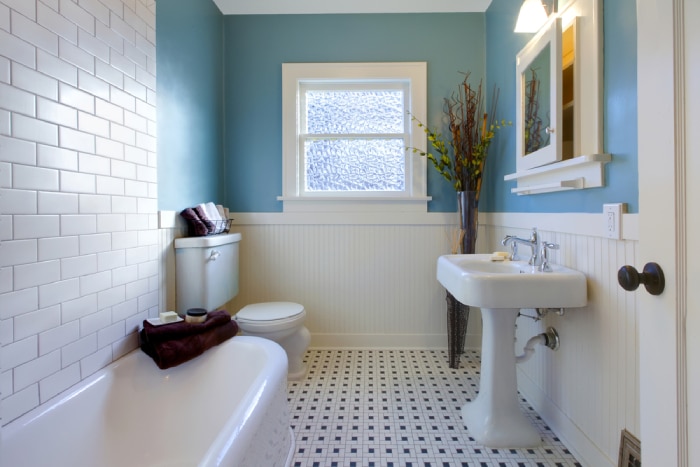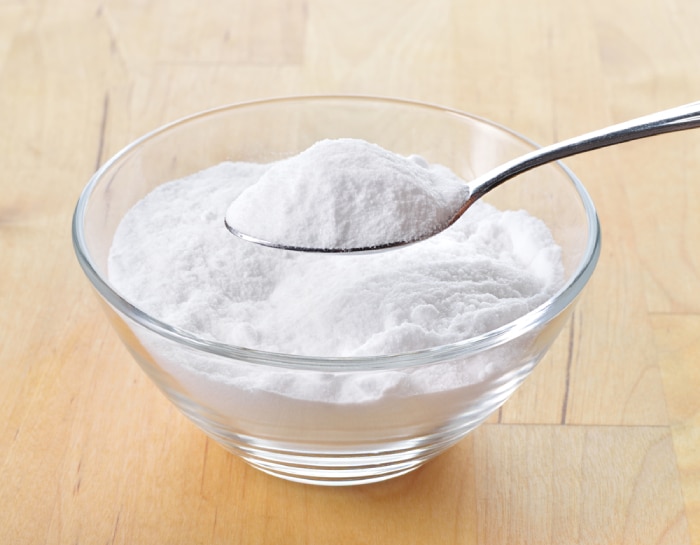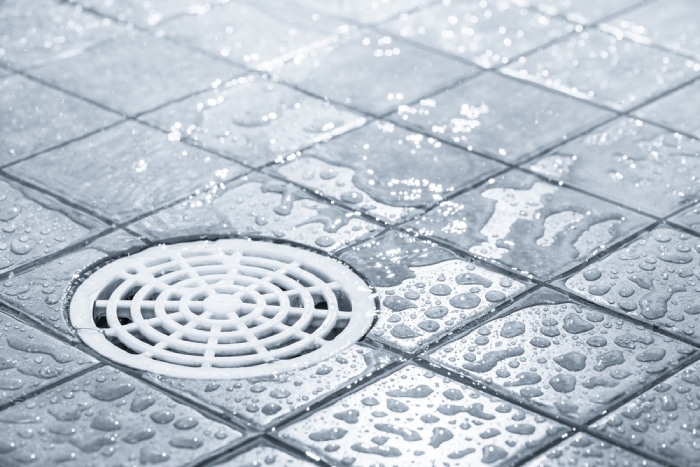how to clean shower tiles without scrubbing
Clean shower tiles look amazing. They really bring out the best of any bathroom.
But boy, do we all know how much work they can take!
A quick bathroom clean quickly turns into a multi-hour episode ending in sore arms, sweat-covered clothes, and a "mostly" clean set of tiles. I've been there, and I know many others have too. To help, I've put together this guide with methods to easily clean your tiles – and keep your clean.
If that sounds good, then let's dive in!

Pre – Treating Your Shower Tiles
Whatever type of shower you have, you need to run the shower at its hottest temperature for about 5 minutes. The very hot water and steam will loosen any stubborn dirt and grime.
If your shower runs into a bath, close the shower curtain so that you're trapping as much steam power as possible! If your shower is free standing and has a door, close the door firmly once the shower is running.
If your shower has a detachable/movable head that's great – direct the water over the dirtiest areas so that ingrained dirt is lifted.
Once the shower has been running for about 5 minutes, switch it off and gently wipe over and around the tiles in a circular motion with a rough textured clean cloth.
Be very careful when switching the shower on or off that you don't burn or scald yourself.
Tile Cleaning Solutions That Do the Work for You
Vinegar
Vinegar is anti-bacterial and works magic on grimy tiles! Simply mix one part vinegar with one part water and spray the solution onto your shower tiles using a spray bottle.
Apply a generous layer, making sure that you get it all over the tile grout too. Leave this solution sitting on the shower tiles for a good 30 minutes to allow it to work fully. When it's done soaking off all that soap scum and grime, put your shower onto its hottest and most direct spray setting and rinse the tiles thoroughly.
Baking Soda Paste
Baking Soda or Bicarbonate of Soda is very effective at removing both bad smells and stains in the shower.

Mix baking soda and water until you have a paste the consistency of toothpaste. Rub this paste over the tiles and into the tile grout until the areas you want clean are totally covered.
If you're wanting double the cleaning power, use your vinegar spray solution here, and spray over the baking soda paste on the tiles. You'll notice some bubbling as the vinegar hits the baking soda – this is great because that bubbling action is lifting off dirt! Wait a couple of minutes and then once the bubbling action has subsided, rub off the mixture in a circular motion, using a rough/coarse textured piece of clean cloth.
Rinse afterwards 2 or 3 times with warm water to remove any residue, and then pat the area dry with a dry towel. Make sure to dry thoroughly to avoid moisture build up that can lead to mildew.
Hydrogen Peroxide
Hydrogen Peroxide is both environmentally friendly and easily available at most drugstores or large retailers. It's also a cost effective cleaning agent when compared to 'off the shelf' products.
To make up a cleaning solution in a spray bottle, use 1 part Hydrogen Peroxide to 2 parts water, so for every half cup of Hydrogen Peroxide you'll be adding 1 cup of water.
Spray this mixture generously over the shower tiles and allow it to soak in for about 30 minutes. When the 30 minutes is up, rub over the shower tiles firmly with a rough textured cloth, rinsing it out as you go to get rid of shower scum and built up soap residue.
Once you've wiped all over thoroughly, dry off the tiles with a clean towel, making sure to soak up water out of the tile grout.
For getting stains off the tile grout, Hydrogen Peroxide is just as effective. Mix 1 part Hydrogen Peroxide with 2 parts baking soda, then let the paste sit on the grout for about 30 minutes. Remove the paste by wiping firmly with a rough textured cloth, and then rinse the tiles and the grout to remove any residue. Dry thoroughly when you're done with a clean towel.
Oxygen Bleach
You can find Oxygen Bleach at larger retailers like Lowes, it'll be in powdered form.
Add 3 tablespoons of the bleach into a 2 gallon bucket or container of warm water, and mix it for about 30 seconds. Using a cleaning cloth, soak it in the mixture and then wipe it all over the tiles and the grout.
Leave the bleach cleaning solution sitting on the tiles and grout for 15 minutes and then rinse off well with water. If you still have stubborn stains clinging onto the grout for dear life, you can try this next trick:
Mix the powdered bleach with a bit of water until it becomes a sticky paste. Using an old toothbrush, apply this paste to the problem areas and wait another 10 minutes before removing it with a rough cloth. Rinse well afterwards to remove residue from the paste and dry thoroughly with a clean towel. After using bleach in the shower, leave the shower door open for a while and open the bathroom windows, this will ventilate the area and get rid of lingering bleach odors.
Chlorine Bleach
Chlorine Bleach is a very tough cleaner and it's a bonus product because it's also a disinfectant. Only use old cleaning cloths/towels if you're using it though, as it can damage fabrics.
Also, open the windows and leave the shower door open to avoid a build – up of strong bleach smell and to make sure that you're ventilated enough, as we've said it's a strong product and needs to be used with caution.
When using Chlorine Bleach, NEVER MIX it with either vinegar or ammonia based products as these can produce dangerous gases that are harmful.
Make a mixture of ¾ cup of bleach to a gallon of water and apply all over the tiles and grout, then let it sit for 15 minutes. Rinse the tiles off well to remove any chemical traces. Remember to only use Chlorine Bleach when every other cleaning agent has failed – using it too often can erode the grout between your tiles!
Vinegar and Dish Soap
In a spray bottle, mix 2 cups of vinegar with 3 tablespoons of a dish soap liquid like 'Dawn'. Shake this mixture up very thoroughly, and then spray it directly onto your bathroom tiles and grout. Use a generous amount, being sure not to miss any hard – to – reach spots! Leave the mixture to sit on the tiles for 20 minutes, and then rinse off well, and dry with a towel.
Vinegar VS Calcium Deposits
If you have hard water stains in your shower that have left calcium deposits, vinegar is your bestie. Using common white vinegar, douse the shower tiles and let the vinegar sit on the tiles for 20 minutes.
Vinegar is acidic whilst hard water deposits are basic, so they cancel each other out – it's chemistry magic at work in your bathroom!
Wipe the affected areas off firmly with a rough textured cloth and then reapply another coat of vinegar and again wait 20 minutes. Using a rough sponge made out of something like nylon, go over the area firmly to remove those tough calcium deposits.
If you still find that calcium crystals are present when you're done, you can use an old toothbrush dipped in vinegar to move these out of the grout areas. Finally, rinse the tiles and grout well in cold water and dry off using a towel.
Protect Your Shower Tiles from Dirt and Grime
- Provide a bathroom or shower trash container. This avoids shower users leaving things like toilet paper, used up make up containers or empty tooth paste tubes in or around the shower. These items of clutter attract dirt to your tiles and make cleaning a chore because you have to throw them all out before you can even get started! Rather provide a dedicated trash container and empty it once or twice a week as usage demands.
- Dust, sweep or vacuum regularly. Getting rid of dust and debris on the bathroom floor means that it doesn't end up in shower to form grime!
- Apply a tough acid – based cleaning agent twice a week after you shower and let it sit on the tiles. This will remove tough build up without intense scrubbing.
- Keep other surfaces dirt and dust free. Things like counter tops, baseboards and the toilet cistern can all attract dust and dirt that can find its way into the shower. Keeping these areas in good nick reduces shower cleaning time and effort.
- Keep your product bottles organized and clean. Before you step out of the shower, make sure all bottles/containers are firmly closed, then rinse them off thoroughly to remove excess soap dribbles and soap scum. Once clean, replace them on the shower rack and keep this well organized. Throw out empty bottles for things like shampoo regularly so that they don't accumulate and gather dirt.
- If you have one, keep a hand – held vacuum in the bathroom for picking up hairs, threads and other debris. A quick 'once over' a couple of times a month will cut your intensive cleaning time drastically.
- Talk to your local plumber or hardware retailer about installing a hair catcher in your shower drain. This will prevent water building up and leaving ugly soap rings on your shower floor tiles.
Unclogging the Drain
A clogged shower drain will lead to bad odors and poor drainage, so let's look at unclogging the drain too. The major cause of shower clogs is human hair, it builds up from normal shower usage and before you know it the drain is clogged. Here's how to sort it out:

- Take a wire coat hanger apart so that you have a strong but flexible piece of wire, form a hook in it at the end.
- Grab a garbage bag or plastic packet to hold the hair once you've fished it out of the drain.
- Unscrew the drain cap if your shower has one, or reach into the drain pipe itself with the coat hanger and push it down far enough that it goes past the matted hair and other debris.
- Gently pull the hooked wire back out, trying to snag as much of the hair as you can. You may have to do this more than once to get all of it out. Once the drain is hair – free and empty of debris, replace the drain cap if you've removed it.
- Clean your shower drain like this weekly, particularly if you have long hair or people sharing your home with long hair, as it can build up in your shower drain system.
how to clean shower tiles without scrubbing
Source: https://applianceanalysts.com/clean-shower-tiles-without-scrubbing/
Posted by: goodsoncined1957.blogspot.com

0 Response to "how to clean shower tiles without scrubbing"
Post a Comment